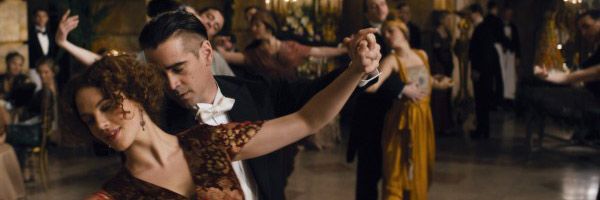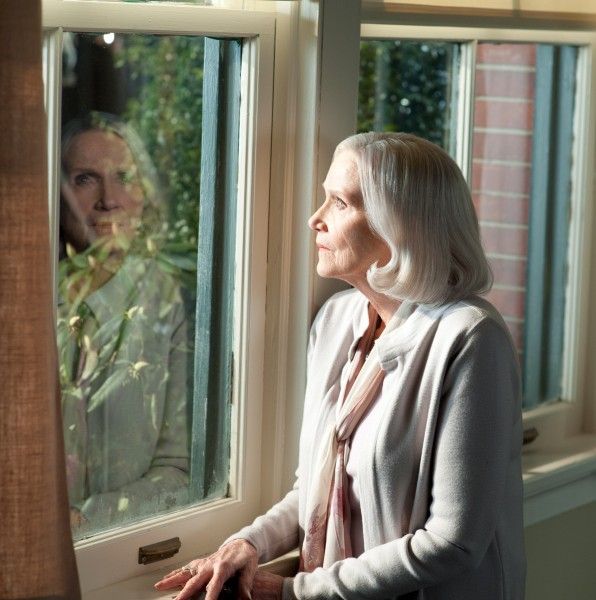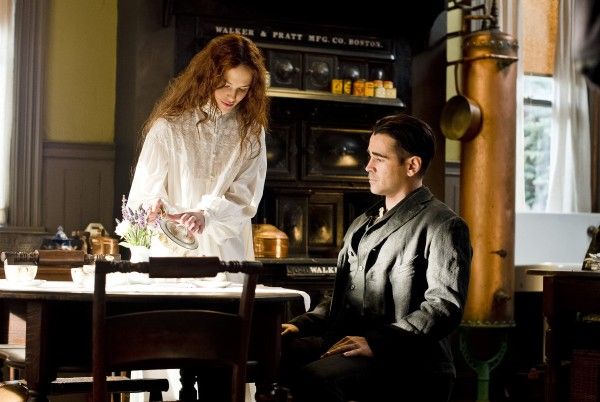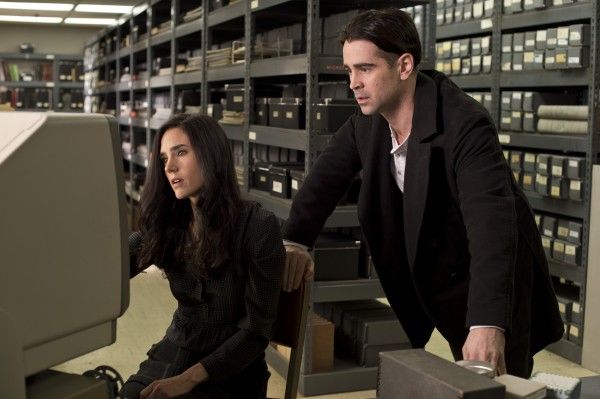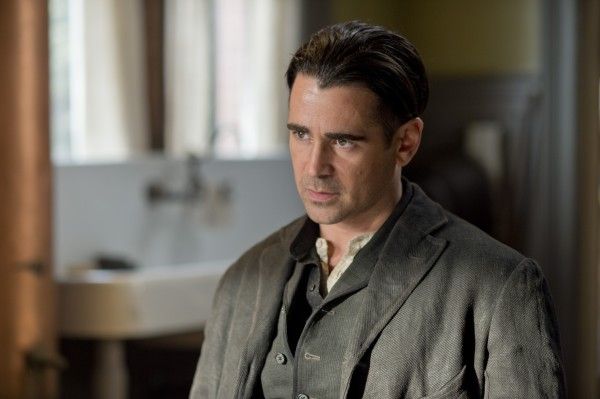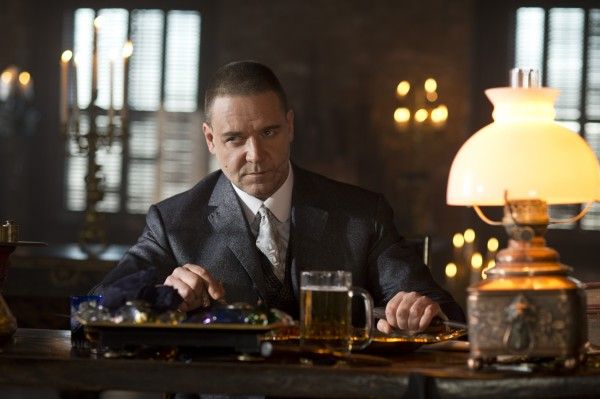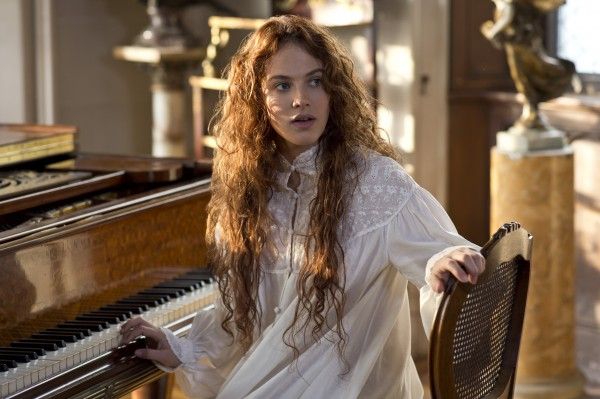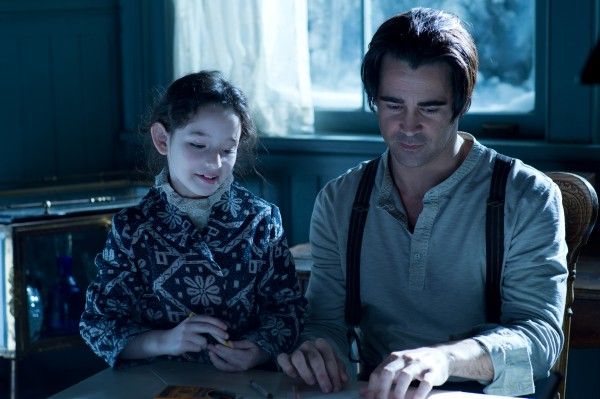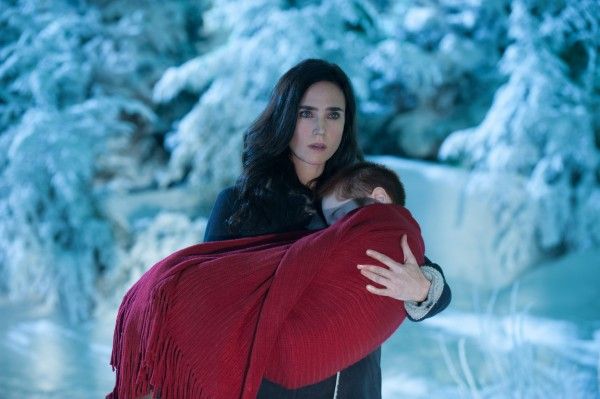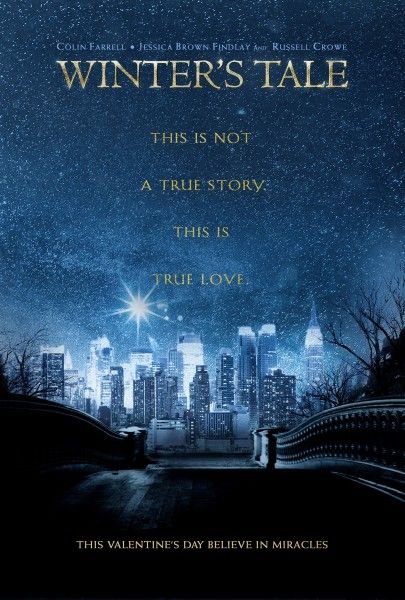Life isn’t a fairy tale. Life requires life beyond loss and according to writer-director-producer Akiva Goldsman, that’s why we need fairy tales for adults like his new movie, Winter’s Tale. The book-to-film adaptation stars Colin Farrell as a thief named Peter Lake. Peter’s perfectly fine stealing to get by, but after crossing paths with Jessica Brown Findlay’s Beverly Penn, he abandons everything he’s known for something he’s experiencing for the very first time – true love.
Just ahead of the film’s Valentine’s Day debut, Goldsman, Farrell and Brown Findlay as well as co-stars Jennifer Connelly who portrays Virginia, a mother with an ailing daughter whose fate becomes intertwined with Peter Lake’s, and Eva Marie Saint who steps in as the older version of Beverly’s younger sister, all sat down for a press conference in New York City. Check out what the gang had to say about the challenge of enticing an audience to suspend disbelief, their personal experiences with miracles, the ups and downs of shooting the film’s most intimate scene and more. Hit the jump for more.
Question: This story has a lot of elements. There’s destiny, there’s sci-fi, there’s a religious touch with good and evil, etc. What about it did you enjoy most and/or least?
EVA MARIE SAINT: I enjoyed Colin Farrell.
COLIN FARRELL: I was partial to Eva Marie Saint as well.
AKIVA GOLDSMAN: I enjoyed Colin Farrell. [Laughs] Winter’s Tale starts off, always has, as this very lucid genre of magical realism, which is, you know, very much not something we do typically as Americans in film. It’s the coexistence of serious dramatic scenes and a flying white horse, and that is either delightful to you or aversive. To me, it has always been something remarkable. It divided people and drew people in from the first moment the book was published all the way through this object. For me, what it finally became I think is, the movie is kind of a secret message. It’s kind of a decoder ring. It’s a wink and a nod to people who have had loss and the need to believe in magic when you have, and that’s what drew me to it.
Do you think love is sometimes overrated and that’s why we need Valentine’s Day to remind us of it?
FARRELL: Overrated? No. Possibly underrated the importance of it and how its prevalence in a single person’s life or in the life of a shared community can make incredible changes and can promote the idea of peace and harmony within a society or within a person’s individual existence. I think love is ... [singing] All you need is [love]. No, it really is. It has to be the one thing it seems that defines us as human beings, our ability to care for each other, our ability to demonstrate through acts of compassion a concern for your fellow man. Valentine’s Day, I don’t even know what that’s about. It’s whatever you make it. You know, some people put up a Christmas tree and other people don’t. I don’t think there’s anything wrong with flowers and chocolate cover maraschino cherries. It’d be nice if it didn’t take such a publicly promoted or commercially promoted holiday for people to extend themselves in gestures of love, but yeah, I think love is really what makes it all spin.
Jennifer, what about you?
JENNIFER CONNELLY: I agree. In my opinion there’s nothing that I’ve experienced that’s more powerful and magical than love and I think in this film, love is capable of bending time and materially shaping the physical universe and I think that that’s really special.
Eva, you seem to want to jump in on this love thing?
SAINT: Eva Marie.
Oh, you do say Eva Marie?
SAINT: Let’s just get that straight. [Laughs] She’s so demanding. I’ve been married almost 63 years, to the love of my life.
FARRELL: What do you know about love? Next! [Laughs]
SAINT: If I don’t know it by now, I never will, and that’s kept me really going in my life, plus my children and our grandchildren. I don’t know how I would have gotten through this life without someone to really love me and I love them, him, and them. It’s forgiving. Love is very forgiving to one another and your friends and it’s a powerful, powerful emotion and it’s my favorite emotion in life. Now, write that down and read it and remember it.
Colin, you jump back and forth between centuries quite often.
FARRELL: Tiring.
Was it confusing? How did you remind yourself which century you were in?
FARRELL: If I was wearing the wig, I was contemporary. [Laughs] No, it was all very clearly demarcated in the script and it was all clearly demarcated in the shooting of the film. The later Peter Lake is somebody who exists very uncomfortably in the present. Each day is kind of devoid of meaning because it’s a repetition of the day before which he can’t remember. It’s almost like a Groundhog Day. He goes to bed at night and wakes up the next day and it’s the beginning of a life that he has no reference point for, has no idea of what his origin is, and we as human beings, we judge ourselves in our present based on our own origin stories on where we grew up, where we were born, what our family was like, how our cultural references informs our personalities. So, it was interesting. It was fun, but it was certainly a very much more comfortable, very much more grounded Peter at the beginning of the story, as flighty as he seemed at the beginning of the story, because as much as he had a battle, as much as he had an internal rub based on his upbringing and his orphan status and his disassociation from any sense of family until he meets Beverly and her family, the Penns. He’s okay with his discomfort. But it’s just later in life when he is consumed by this sense of loss, but he has no idea where the loss comes from that he experiences this profound discomfort that is agitating more than anything else and disturbing more than anything else.
Akiva, what was the process like deciding what to omit from the novel and what films do you think would make a great double feature with Winter’s Tale?
GOLDSMAN: Fright Night? [Laughs] Adaptation is always the same process for me, which is some version of throwing the book at the wall and seeing what pages fall out. It is trying to imagine, remember the story, read it, put it down, and then write sort of an outline without the book in front of you with some hope that what you like about it will be filtered and distilled out through your memory and then that will be similar to what other people like about it. But you can never tell, so for me, adaptation is sort of using my own memory and imagination as a template and trying to distill what is important to me out of an object. This one was easier than it appears to be because there are 300 or so pages in the middle of the object dedicated to a character named Hardesty Marratta who existed in the one draft in an encounter with Jenny’s character in the very beginning and never made it past the first draft. So, really, the book was smaller than it might seem to be when it came to adaptation. And what would make a nice double feature with this? Downton Abbey marathon?
Eva Marie?
SAINT: I just want to say that I believe the love scene between this talented lady, Jessica, and Colin is just one of the most beautifully done and so tastefully done, Akiva. It left something to the imagination and I find in love scenes today, they try to show everything, you know, that’s not the real thing anyway and this is so beautifully done. It brings tears to my eyes, Akiva. I’ll never forget your profile with the kiss and Colin and I wanted to be there. [Laughs]
JESSICA BROWN FINDLAY: It’d be a whole different movie.
SAINT: In your place!
GOLDSMAN: [Points to his mic.] You know these are on, right?
Jessica, how was it filming that scene?
BROWN FINDLAY: Well, I mean, it’s a beautiful moment and I suppose they’re kind of aware of, you know, finding the comedy within something and the naivety and the joy of it, and a really special moment, but one that is, I suppose, for the both of them, is new in the sense that it’s just true love in its highest sense. I suppose for Beverly especially, it’s something she never, ever, ever thought would happen, someone to love her who’s not asked to, like a family member or something. She’s found real, true love from a stranger and it’s become something beautiful.
Did you ever think that might happen, working with Colin?
GOLDSMAN: Let me disabuse you all of something. Love scenes are the most horrible thing you can ever ask actors to do. Just try to take a moment, now take off your clothes, no but here. No, really. No, no, really. Love scenes are the hardest things in the world and if you enjoy them, that’s wonderful, because nobody making them sits there and goes, ‘Let’s do that again tomorrow.’
FARRELL: I don’t know that I agree. I really don’t. Maybe that’s awfully sleazy and cheap of me, but it’s not that I get personal kicks or gratification from them, but I do think that human touch in whatever form it comes in, as long as that form is one that is mutually compassionate and respectful, is a really gorgeous thing. So while it is an atmosphere of absolute artifice and it’s not romantic and it’s never going to be sexy, if two people who are involved in it are on the same page and taking care of each other, there are worse days in the office.
Akiva, there are so many different areas of science here, if you will. The movie touches on the stars and the light, but it doesn’t actually give any final answer to any of that. Was that from your input on it? How did that come about?
GOLDSMAN: Yeah, I mean, the mythology of it is it’s some marriage between me and Mark Helprin, who wrote the novel. The cosmology of Mark’s book is very, very, very complex, even more complex than the movie is. I tried to distill it down to some extent. Part of what is really clear in Mark’s book is the notion of light and its grammar as part of magic as something transformative, the idea that light is operating all the time in ways that we can’t see, that there is more to the world, there is a world behind the world and so, what we tried to do with the movie is talk about it, but also show it, you know? So there’s that scene where when Jess, playing Beverly, says, ‘The sicker I become, the more I can see that everything is connected by light,’ we jump up and just connect stuff by light. It’s not particularly subtle, but quite pretty, and that’s the use of flares and what we sort of did is we made believe that the camera could see magic even when the characters for the most part couldn’t and that gave us a little bit of an organizing principle to use light when something magical occurred, so even if you’re not noticing it, when Russell [Crowe] is lurching forward or Will [Smith] is morphing, or these guys were jumping, these are all sort of digital anamorphic flares that are used to sort of create the idea of the magic flaring out.
Colin, can you talk about working with the horse in this movie? I know you shot with more than one though. And for casting, this is the first movie Jennifer has done with Russell since A Beautiful Mind. I was wondering, did you know that both this film and Noah would come out in the same year? And also the casting of Will Smith, because a lot of people have never really seen him play a villain before.
FARRELL: Ummm … I think it could double bill with Lars von Trier’s Nymphomaniac. [We could have] Eva Marie Saint’s opinion on the love scene. [Laughs] The horse that I worked with was beautiful, really nice character, because horses are people too and they differ in the way they carry themselves through the world and the way they interact with each other and the way they interact with people and I had a very understanding and very kind horse named Listo. I think there were two horses, you’re right, but the other one was more like a relief pitcher who came on when Listo was tired or agitated, which he would be having me on your back for eight hours a day, but he was a wonderful, wonderful beast. It was the first time I flew on a horse, which wasn’t as scary as it would seem. No altitude sickness or fear of heights involved, because I was actually in a green screen studio sitting on a barrel, which was one of the more mortifying experiences that I’d take way after I’d choose a love scene. But yeah, he was gorgeous. I love working with horses. People say you shouldn’t work with animals and children; that’s wrong. You must only work with children, because you only work eight hours a day and I love working with animals. Animals have an honesty that human beings reach to find in their lives at the best of times.
GOLDSMAN: The casting of this movie is, more than anything else in my career, is a function of unbridled affection. We didn’t have the money to make the movie. Warner Bros. looked at it and budgeted it and said, ‘It’s $80 million dollars on a good day. Here’s half of it,’ and I said,’ Thank you,’ because that’s what you do when somebody gives you even half of what you need to make the thing that you love the most. Everyone at this table did it for love or kindness or friendship or belief in some idea of the way the world works and magic inside the world. The casting process was entirely that, from people that I’ve know well for a long time to people who I’ve known and wanted to work with a long time, to heroes, to brand new pieces of talent. It’s been amazing. Will’s a friend and I needed the devil, and I said, ‘What do you think?’ And he said, ‘Sure.’ Hollywood is about that big [gestures to denote a small area], which is the good and the bad news, so yes, I knew that Russell and Jenny were in fact making a movie and actually went horrifically from the Noah set to our set. We were shooting here and Noah was shooting here, and Sandy was raging here. So, it was actually a very complicated time for the city and secondarily, obviously, for movies trying to manage to have two actors in two different movies, but you know, friendship and alcohol prevailed.
One of the things I found really amazing about the film is it’s unabashedly a fairy tale and it is not one for children. Do you think we get too old for fairy tales, and if not, why are they necessary for adults to see?
GOLDSMAN: I’ll jump in first. I agree. I think this is a fairy tale for grown-ups and I think it is very pointedly a fairy tale for grown-ups and that’s what we set out to do. And it’s an interesting object because the first two thirds is a fairy tale for kids and there has always been in my life, in the development of this project, those people who say, ‘Well, can’t it just be over there? Can’t that be the movie?’ … The reason it’s a fairy tale for grown-ups is that life is in fact sinful. Life actually includes loss and life doesn’t end with love. Life requires life beyond loss, and this movie is a Hail Mary to faith, the idea that even though it doesn’t turn out the way the storybook promised, there’s a story behind it all that we can find.
This movie makes a point of saying that every person has a miracle. Have any of you ever witnessed something or done something that you would construe a miracle?
SAINT: I think if you meet the right person in life and you fall in love, that is a miracle. My husband saw me on the subway. That is a miracle! Yeah, well that is another story. That’s another movie, Akiva. [Laughs] Is that not a miracle? How else can you explain it? There are so many things. I mean, your children, they’re miracles. Your grandchildren, they are miracles, but that’s my thought.
CONNELLY: I’ve never seen a flying horse or anything like that in my real life, but I have seen things similar to what Eva Marie was saying that are miraculous to me, whether or not they’d be qualified as bona fide miracles. It sounds like a horrible cliché, but yes, I have three children; yes, they’re each miracles to me.
Colin, you’ve spoken in the past about your tremendous regard for screen legends. What was it like working with Eva Marie Saint? And Eva Maria, what enticed you to do this project?
SAINT: Let Colin answer first.
FARRELL: Working with Eva Marie Saint was a dream. I had one of the most incredible periods of the last 15 years on a film set that I had with her, and I’ve been aware of her work since I was in my early teens, which is not that long ago. But I love working with actors who are just slightly older than me, but have a greater kind of depth of history with regards to life and film, and working with Eva Marie Saint, as working with Christopher Plummer, I think were two of my favorite experiences. She’s a wonderful actress, but more importantly, always more importantly, always the cart that should go before the horse is the human being and how you find them as a person and I just adored the bones of her and I was really spoiled to be able to spend time with her on the set and it will stay with me all my days, which I hope are plentiful.
SAINT: Colin and I became lovers. [Laughs]
FARRELL: In his mind. [Laughs]
SAINT: You know Hollywood. You know actors. I’m playing the older woman because I’m old and I’m still working, but she’s older than I am in the movie, a hundred and something, but she’s still working at the paper and I think that was such an interesting idea for me to show women still working, still dressing nicely and so forth, and I just loved the scene when she sees Peter and somebody said, ‘How did you know to put your arms out like little Willa did?’ How did I know? I don’t know. I didn’t see those scenes. Akiva said, ‘Just put your arms out.’ I didn’t know that. How was I supposed to know? I didn’t see the rushes, but it’s so interesting, Akiva. So many people mentioned that yesterday and that’s so simple that that’s the little girl and every time she did that. But Colin, you haven’t done that when I go like that to you.
FARRELL: The day is young, darling.
Mr. Goldsman, you’re asking for us to take a willing suspension of disbelief of a tremendous level. I’m wondering if in forming the basis for this film, you just decided to do it without thought of the cynicism of the world we seem to live in. And then for the actors, is making a magic realism film different in terms of your approach to your characters?
GOLDSMAN: I loved the novel and I love entertainment that is not cynical. I choose not to be cynical. I’ll go toe to toe with anyone in the room over reasons to be cynical. So, it’s a choice, and for me, a worthwhile one, and a worthwhile communication because the other is too easy. There are too many reasons to give up or to not care. It’s my choice. I don’t say it’s right or wrong, but it’s mine. To then convey cynical ideas would be not true for me. It doesn’t mean that I can’t be as old and tired and begrudging of the universe as anybody at the end of a long day, but I try to practice the belief that there is reasonableness and meaning. Some days it’s a lot harder than others, but I’d like that messaging to be in what I do. It kind of always has been and it’s not that life has given me less reasons to be cynical. It gives me more, but I choose to push past. That’s just me.
And the performances? Do they change in a magic realism film versus a hyper realistic drama?
FARRELL: One of the cruxes of the bedrocks of this film is the presence of a love that defies linear time and the kind of internal existence of something that is felt, but can’t be defined by thought and poets are still trying to do it centuries later through language and some of them get close, but love will never be defined in a quotidian way or an empirical way where it can be judged or measured. So with that in mind, any of the more magical elements to the film, any of the more fantastical elements, whether it’s a flying horse or time bending over on itself or someone existing for 100 years and not aging, were things that you became a subject of and they were almost, I think, almost easier to write off as awe-inspiring events than - the whole depth of the love between Peter and Beverly is the most magical and fantastical element of the whole film. It’s much more magical and much more fantastical even, and yet, beautifully and gratefully much more possible than a flying horse. So, not really so much. The whole script and the story seemed like this exercise in the defiance of disbelief and things happening in a person’s life that they never thought or comprehended could happen. Peter wasn’t looking for love and all of a sudden, this world opens up to him and the world of his former existence and the self preservation and the kind of defense of energy with which he had to carry himself through life just to survive begins to crumble and fade away and this path of love and gentility and light and true interconnectedness presents itself, so that was, for me, the most magical and fantastical element of the film.
Jennifer, in the movie, your character is a parent. What process did that character need to go through to leave the belief in science and switch over to the belief in faith? And for everyone, the movie is set in a winter setting. Did you guys have to work in the winter weather and how did you deal with that?
CONNELLY: The conceit of this movie is that magic exists in this world, in this very real world and right now, and I think there’s something inherent in her, an inherent openness to that possibility that magic might exist. And I think that when she first sees Peter, something resonates with her, but on top of that, I think that that is compounded by her position in life that she unfortunately finds herself in. She has a daughter who is terminally ill and she’s been told by everyone that there is no hope, and so she’s sort of reined that in. She’s tried to rein that in and tried to process that, tried to process fathoming the possibility that there could be no hope, and I think it’s terrifying for her when she meets him and he’s saying, ‘Trust me. Give me a chance,’ and I think a lot of things go through her very, very quickly, but I think a glimmer of a possibility that could it be true, absolutely. She’s so desperate to save her girl. She would absolutely throw herself off a roof with a perfect stranger on a flying horse just in case it could have been true.
And the wintery conditions? Did you have to shoot in the cold and snow?
FARRELL: Jessica? Barefooted wonder.
SAINT: And in the nude.
BROWN FINDLAY: Yeah, we shot in New York in the winter and the snow, and sensibly everyone else is in winter coats and furs and thick woolen jackets and everything, and my character, she’s constantly warm from consumption. She is in summer dresses and bare feet, but yeah, you just have to do it. Some of the snow was fake, maybe sometimes when I have bare feet.
Mr. Goldsman, towards the end of the film, Beverly says that no one person’s life is more important than any other’s. Did you ever consider not including that and leaving it to the viewer’s interpretation?
GOLDSMAN: It’s a line from the novel, which I very much like, and I think that it’s quite important. When you develop a movie, it goes through lots of opinions before we actually end up making it. [One of the] most common sentiments was, why is little Willa special? Why would everything conspire to save this one little girl? Who is she going to be? And then people would pitch ideas. Is she going to be president? And some of it I actually put into a speech of Russell’s when he’s talking about Beverly because somebody said to me, ‘Is she going to be pope?’ People objected to the idea that she wasn’t saved for a reason, but what I loved about the book is we’re all worth saving, and that you don’t have to be special for the universe to take care of you and that it is taking care of you even when you can’t see it.
Since we’re short on time, how about a quick pitch of your character? What did you get from your character?
BROWN FINDLAY: I suppose just the idea of Beverly being someone who has accepted everything that will come, will come quickly and is alive, but not living. At the end of her life, she ends up living more than some of us are ever lucky enough to live and she sees things in such a beautiful way and is incredibly brave.
SAINT: That was beautiful!
CONNELLY: I’m terrible at pitches. [Laughs] I’m really bad. In response to the question about what I relate to in my character, I suppose, my character is a link for Peter Lake to his past and to his own destiny, but in her own right, she is first and foremost a mother and I think that’s what really defines her, is her love for her daughter and so I suppose that is what I recognize most in her.
Colin gets the last one.
SAINT: He always does.
FARRELL: I think it just kind of solidified a suspicion I already had that I think I’m okay with life being defined more by mystery than by certainly because certainly has done nothing but get me in a lot of trouble [laughs], my own certainty and my own ideals, my own attachments, and I’m okay the older I get, reaching and hoping and aspiring to know less and less and less.

